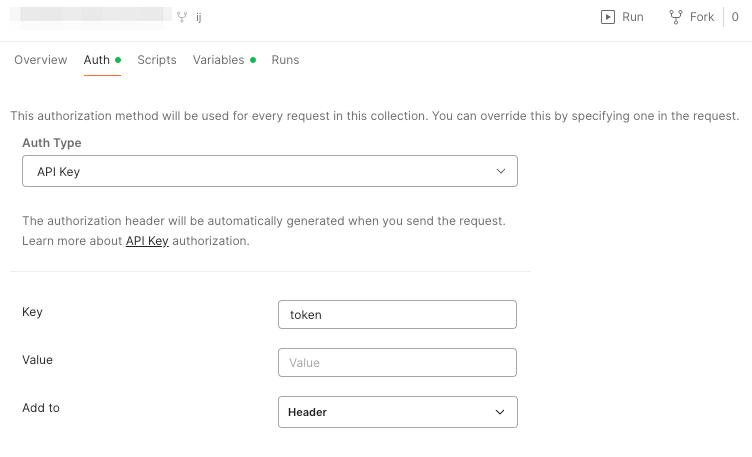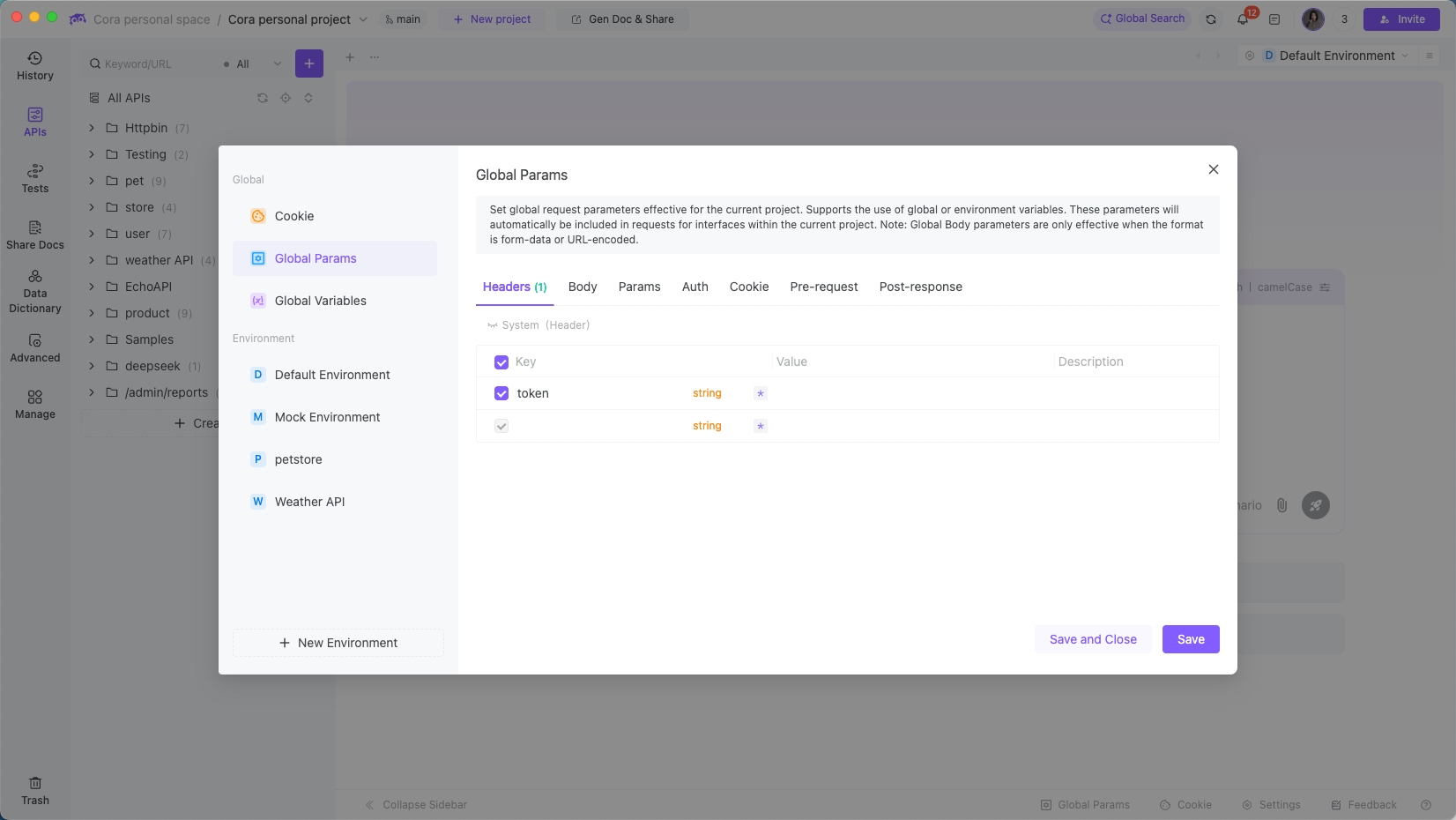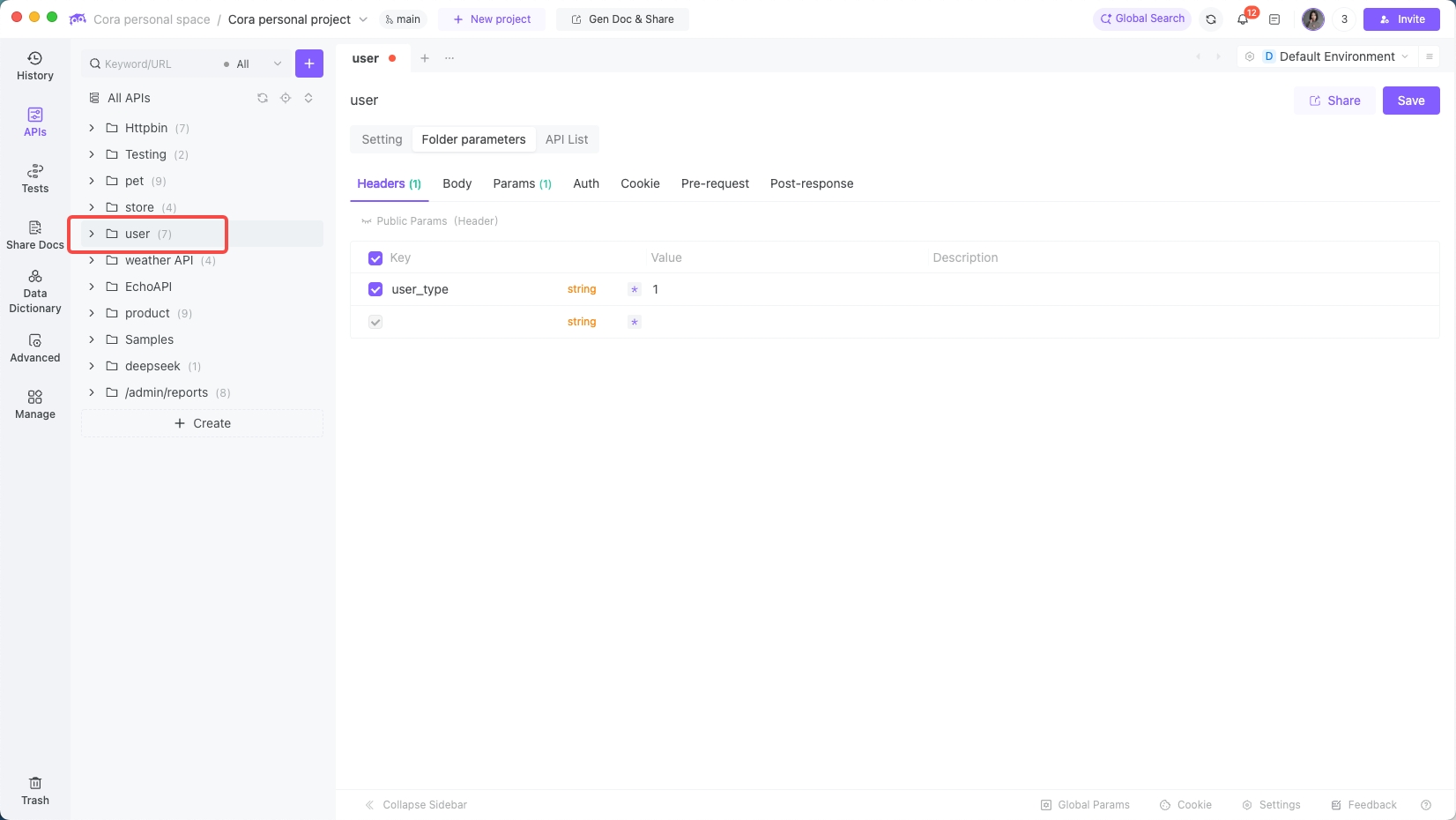Updating 187 API Parameters at 2 A.M.: How EchoAPI Fixed What Postman Couldn’t — in Just 5 Minutes
Every API engineer knows the pain: endless parameter updates, expiring tokens, and folders full of duplicate scripts. This story dives into how EchoAPI’s Global and Folder Parameters replaced hours of manual editing — and changed the way I manage 187 API requests in one go.
As an API testing engineer with 8 years of experience, I’ve spent countless late nights trapped in a loop of repetitive Postman clicks — like updating an expired token at 2 A.M.
Sure, Postman’s global authentication feature lets you configure tokens globally. But when I needed to change the app_version header across 187 endpoints, I still had to manually edit each one.
And for our e-commerce project, setting up the same pre-request scripts for 12 endpoints (“Product Query,” “Inventory Update,” etc.) was another tedious ritual. These tasks didn’t just eat up development time — they also introduced the risk of parameter mismatches causing live API failures.
Then I discovered EchoAPI’s Global Parameters and Folder Parameters. That’s when it hit me: a great tool doesn’t just fix isolated pain points — it eliminates repetitive work across your entire workflow.
Let’s dive into real-world API testing scenarios, where Postman falls short and EchoAPI shines.
Postman’s Collection-Level Auth Setup

1. Global Parameters: From One-Dimensional to Full-Scale Parameter Management
The Real Pain Point: Postman’s Global Auth Only Solves One Problem
Last month, our team’s user management system needed to update three key configurations:
- JWT secret (affecting the token)
app_version(upgrading from 1.0 to 2.0)- Timestamp generation script for requests
It was already 11 P.M. when our test team reported mass API failures.
My first move was to use Postman’s global authentication to refresh the token — easy enough. All 187 endpoints updated instantly.
But then came the nightmare:
Updating the `app_version` header meant filtering every folder and editing each endpoint manually. I missed 8 endpoints, broke their version headers, and broke my sanity.
Here’s the core limitation: Postman’s global settings only cover authentication, not Header, Query, or Body parameters. Managing multiple shared parameters still means tons of manual edits — and maintenance time grows linearly with endpoint count.
Typical frustrations include:
- Adding a new
device_idheader across all APIs — Postman has no global input field - Adding a global test assertion (e.g.,
code=200) — must repeat for every endpoint
EchoAPI Global Parameters: One Setup, Full-Cycle Coverage
EchoAPI Global Parameters: One Setup, Full-Cycle Coverage

EchoAPI expands on Postman’s concept of global auth, introducing multi-dimensional parameter management through a project-level parameter pool. It eliminates repetitive setups across every API testing stage.
(1) Multi-Dimensional Coverage: Beyond Simple Authentication
Within Project Settings → Global Parameters, you can configure six categories of shared parameters, each covering a unique testing dimension:
| Parameter Type | Typical Use Case | Postman Effort | EchoAPI Effort |
|---|---|---|---|
| Authentication | OAuth2.0 client_id / client_secret | 1 setup (✔️) | 1 setup |
| Header | app_version, device_id |
187 edits | 1 setup |
| Query | timestamp, sign |
187 edits | 1 setup |
| Cookie | session_id |
187 imports | 1 setup |
| Pre-Request Script | Fetch user ID from DB | 187 imports | 1 script |
| Post-Request Script | Assert code=200, extract vars |
187 assertions | 1 script |
In our earlier incident, EchoAPI turned that 15-minute ordeal into a 5-minute fix:
- Update JWT key in Global Auth — tokens auto-sync across all APIs.
- Add
app_version=2.0in Global Query — instantly applies everywhere.
No manual edits. No missed endpoints.
(2) Variable Referencing: Dynamic Parameter Management
Like Postman, EchoAPI supports variable substitution — but with far broader scope.
Example: Add sign={{sign}} in your Global Query, then generate it via a Global Pre-Request Script:
// Global pre-request script: generate "sign"
const timestamp = new Date().getTime();
const appSecret = "xxx";
const sign = md5(timestamp + appSecret);
apt.globals.set("timestamp", timestamp);
apt.globals.set("sign", sign);
Unlike Postman, this works across Headers, Cookies, Queries, and more — turning static configs into dynamic, secure parameters that evolve with your workflow.
Real-World Impact: 98% Faster Multi-Dimensional Parameter Maintenance
| Operation | Postman Time | EchoAPI Time | Efficiency Gain |
|---|---|---|---|
| Update token + app_version + script | 15 min | 1 min | +93.3% |
| Error rate | 4.3% (8/187 missed edits) | 0% | — |
2. Folder Parameters: EchoAPI’s Answer to Postman’s Missing Layered Management
EchoAPI Folder Parameters: One Setup, Automatic Inheritance

The Real Pain: When Product and User APIs Need Different Parameters
In our e-commerce system, we ran into a multi-layered mess:
- Product APIs (12 endpoints) required
category_id=3(electronics) - User APIs (8 endpoints) required
user_type=1(regular user) - Both shared the same global
tokenandapp_version
Postman had no way to handle this elegantly:
- Option 1: Add module-specific params to each endpoint (12+8 edits).
- Option 2: Use separate environments per module — confusing and error-prone.
Why? Postman lacks hierarchical parameter management. It can’t define parameters at a folder or module level.
EchoAPI Folder Parameters: Hierarchical Inheritance for Modular Precision
EchoAPI solves this with folder-level parameter configuration and deep inheritance rules.
(1) How It Works
Each folder acts as a “parameter domain,” supporting the same dimensions as global parameters (Header, Query, Cookie, etc.).
Inheritance hierarchy:
- Child folders inherit from parent folders.
- APIs inherit from their folder.
- Lower levels override higher ones.
Final priority:API-level > Child folder > Parent folder > Global parameters
Example — Postman vs EchoAPI:
- Global: Add
token=xxx,app_version=2.0(applies everywhere). - Parent folder “E-Commerce”: Add
platform=appin Query. - Child folder “Products”: Add
category_id=3, overrides parent’s conflicting parameters. - API “Product Detail”: Add
cache=1header (inherits all others automatically).
Final effective parameters:
- Header:
token,app_version,cache - Query:
platform,category_id
In Postman, achieving the same would require 5 manual edits per API — with no inheritance or sync.
Postman vs EchoAPI: Parameter Setup Comparison
| Dimension | Scenario | Postman Workflow | EchoAPI Workflow | Efficiency (187 APIs + 2 Folders) |
|---|---|---|---|---|
| Global Params | Add token + app_version |
Token via Global Auth; app_version manually 187× |
One-time setup under Global Headers | Postman ≈ 1.5 h EchoAPI ≈ 1 min |
| Parent Folder | Add platform=app |
30× manual edits | 1 folder setup | Postman ≈ 20 min EchoAPI ≈ 30 s |
| Child Folder | Add category_id=3 |
12× manual edits | 1 folder setup | Postman ≈ 15 min EchoAPI ≈ 40 s |
| Single API | Add cache=1 |
5× manual copy/paste | 1 click + inheritance | Postman ≈ 1 min/API EchoAPI ≈ 10 s/API |
| Update Params | Change app_version to 3.0 |
187× manual edits | 1 global edit | Postman ≈ 2 h EchoAPI ≈ 30 s |
(2) Practical Scenarios: Multi-Module Project Management
For projects with 10+ functional modules, EchoAPI’s folder parameters are game-changing:
- Payment Module: Add
pay_type=alipayonce; all APIs inherit automatically. - Logistics Module: Add
logistics_code=SF; edit once to update everywhere. - Membership Module: Add a folder-level pre-request script to fetch member tier; all endpoints reuse it automatically.
Real-World Impact: Module Parameter Management Efficiency
| Scenario | Postman Effort | EchoAPI Effort | Efficiency Gain |
|---|---|---|---|
| Add module params (Product/User) | 20 manual edits | 2 folder setups | 90% |
Update category_id in Product module |
12 edits | 1 folder edit | 91.7% |
| Add new Logistics module | 15 edits + env setup | 1 folder setup | 93.3% |
| Parameter conflicts | 15% (env confusion) | 0% | — |
3. What This Reveals About the Evolution of API Tools
Comparing Postman and EchoAPI highlights how API debugging tools are evolving:
- From single-point fixes → full-scope coverage
- Postman solves token management; EchoAPI handles all shared parameters.
- From parameter dependency → full decoupling
- Postman ties parameters to APIs; EchoAPI abstracts them globally or by folder.
- From manual input → rule-based automation
- Postman depends on repetition; EchoAPI’s inheritance rules remove human error.
For developers and QA engineers, this shift means more than time saved — it’s a step toward smarter, rule-driven workflows that let you focus on logic, not logistics.
4. Practical Tips: Using Global & Folder Parameters Effectively
- Parameter Classification
- Global: Project-wide (token, app_version, global assertions)
- Folder: Module-specific (category_id, pay_type, module scripts)
- API: Endpoint-specific (product_id, user_id, custom headers)
- Variable Naming
- Use
{scope}_{type}_{name}, e.g.global_header_token,goods_query_category_idto avoid collisions.
- Use
- Script Reuse
- Save reusable pre/post scripts (e.g., token fetch, signing, DB queries) as shared snippets. Reference them globally or by folder for consistency.
- Postman Compatibility
- If your team uses both tools, document EchoAPI’s setups and replicate them in Postman via environment variables — though Postman still lacks true hierarchical inheritance.
Conclusion
The competition between API debugging tools isn’t about flashy UIs — it’s about how deeply they solve real developer pain.
Postman remains solid for global authentication, but when it comes to multi-dimensional global parameters and hierarchical folder-level inheritance, it simply can’t keep up.
EchoAPI’s Global and Folder Parameters don’t try to reinvent the wheel — they just fix what’s missing. By covering every repetitive workflow and applying intelligent inheritance, they bring API management into a new efficiency era.
If you’ve ever thought, “Postman handles tokens, but can’t handle app_version,” or “I’m tired of re-adding the same params to every module,” — give EchoAPI a try.
The first time you add a folder parameter that cascades across 10 APIs — while inheriting global settings automatically — you’ll understand:
A good tool doesn’t just make your job easier; it transforms how you work.




 EchoAPI for VS Code
EchoAPI for VS Code

 EchoAPI for IntelliJ IDEA
EchoAPI for IntelliJ IDEA

 EchoAPl-Interceptor
EchoAPl-Interceptor

 EchoAPl CLI
EchoAPl CLI
 EchoAPI Client
EchoAPI Client API Design
API Design
 API Debug
API Debug
 API Documentation
API Documentation
 Mock Server
Mock Server








